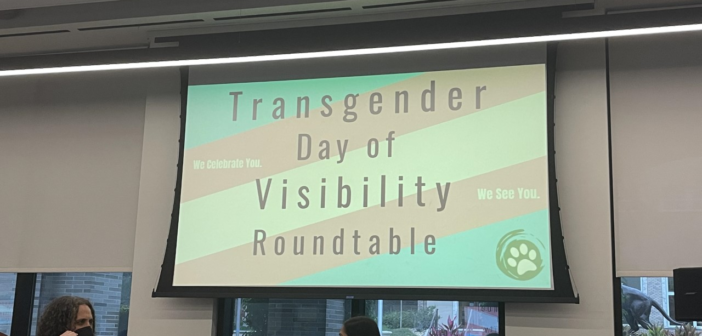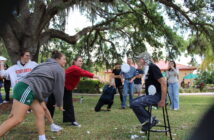Kendonisha Reckley, Contributing Writer
Transgender Day of Visibility (TDOV) is celebrated every March 31. It aims to bring attention to the discrimination and violence faced by the trans community while also celebrating their lives and contributions.
In 2009, transgender activist Rachel Crandall founded TDOV. In an article published by the Women’s Healthcare Associates, she explained that she created TDOV because most media stories about transgender people reflect violence and discrimination.
Crandall felt that the Transgender Day of Remembrance, celebrated in November, was not enough since it only memorializes victims of transphobia who have passed. She envisioned a day that would bring together trans people from around the world and celebrate members of the LGBT+ who are alive today.
Angel Jimenez, advisor of Prism, Ant Aavila and Project Director Noemi Reyes of the Campus Advocacy, Resources, and Education (CARE) organized an event on campus to celebrate TDOV. They noticed the lack of inclusion and decided that it is essential to celebrate the trans and non-binary community members at Saint Leo.
“It was important for us to recognize the Transgender Day of Visibility, and it’s a very important day that I think every institution should be intentional about,” Aavila said, faculty advisor of the Green Dot program on campus. “That’s especially important in today’s age of violence and underhand attacks towards the trans and queer community.”
The organizers expressed the need for a conversation on violence prevention matters for LGBT+ students and how learning about their experiences can help improve inclusiveness and resources on campus to improve the accommodations of the community.
“We saw the transgender day of visibility bring those students out and know that we are here, hopefully, build those relationships,” Aavlia said.
Some of the activities at the event were Trans History Trivia and RoundTable discussion. During the discussion, students learned about the importance of getting educated about being allies to the trans and non-binary community.
“Pronouns should be respected and normalized,” said Savonne Waterman, a junior majoring in criminal justice specializing in forensics, “especially on campus, it should not be emotional labor with having to constantly correct someone, especially with teachers even after telling them.”
While Saint Leo University offers some resources to transgender, non-binary, and non-cisgender students, some feel that there is still much more that can be done.
According to attendees, pronouns provide inclusions energy, especially towards a transgender and non-binary community member, or wearing a pronoun pin is a way of demonstrating that you want to make everyone feel welcome.
After speaking to students who are part of the LGBT community they shared that they felt limited in the number of clubs that they can join to be surrounded by others in the Saint Leo community. One of the clubs on campus that LGBT+ students can join to feel supported is Prism.
“Prism was created a couple of years ago to provide a safe and secure space for members of the LGBTQ+ community and their allies to get together and build connections,” said Christian Buenavides-Diaz, president of Prism. “Since Saint Leo is a catholic university, we wanted to create a space in which students could know that they are welcome and so that they could meet others going through the same situation.”
Prism will participate in events such as “Take Back the Campus” on April 19 from 5 to 7 pm in the SAB Loggia. They will also have Safe Zone training events were students and faculty can learn to make Saint Leo’s LGBT+ community feel welcomed and accepted.
A resource that can be extremely helpful to students in the Library at Saint Leo University. This welcoming space can be found on the first floor of the library, near the elevator. Angel Jimenez welcomes all students, regardless of gender, sexual orientation, or gender identity.
Other resources students and faculty can use to become better allies and advocates for the trans community include online organizations like The National Center for Transgender Equality which educate individuals about transgender policies and give tips on how to become more involved.





